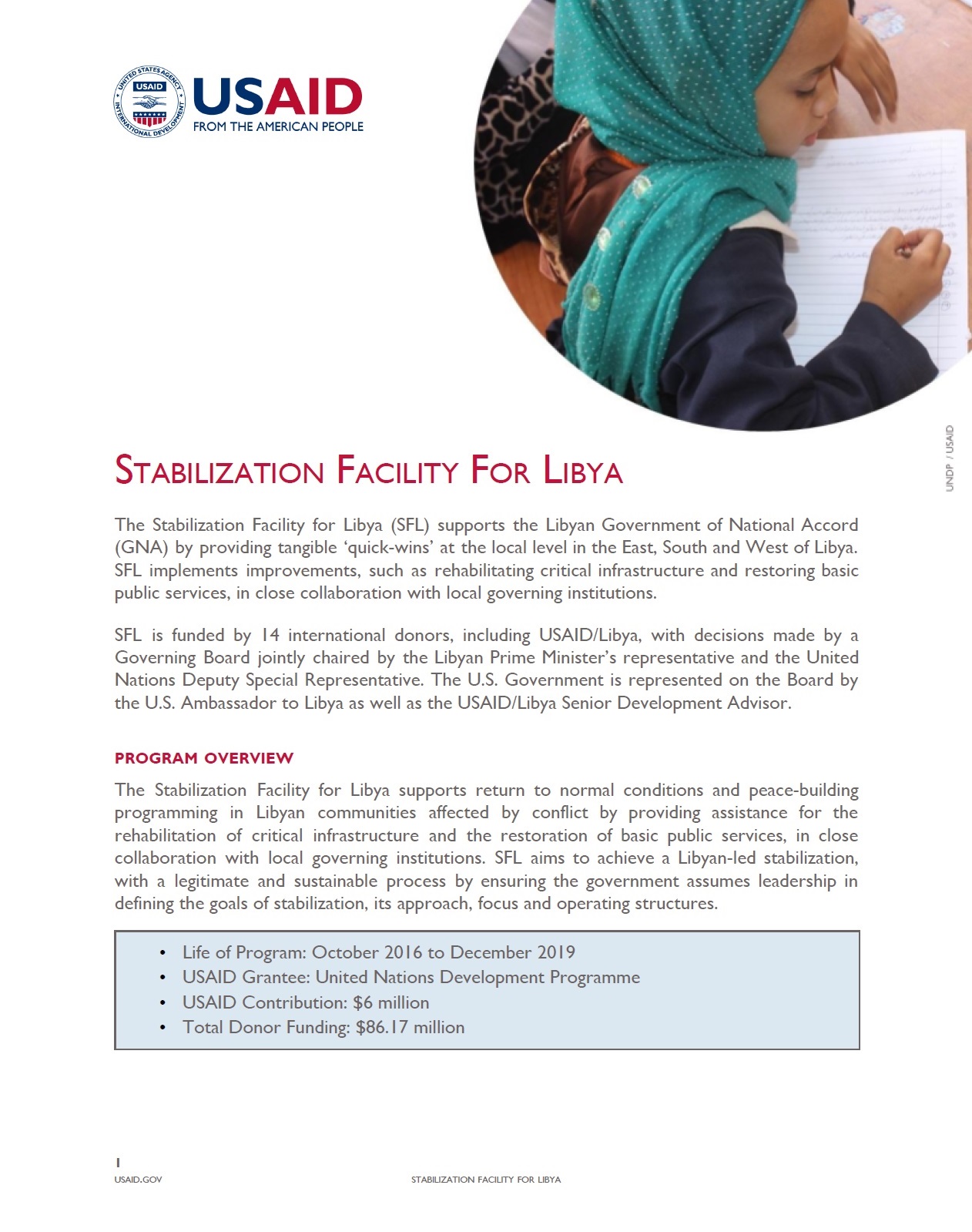Speeches Shim
The Stabilization Facility for Libya (SFL) supports the Libyan Government of National Accord (GNA) by providing tangible ‘quick-wins’ at the local level in the East, South and West of Libya. SFL implements improvements, such as rehabilitating critical infrastructure and restoring basic public services, in close collaboration with local governing institutions.
Stabilization Facility for Libya (SFL) Factsheet ![]() (pdf - 409k)
(pdf - 409k)
SFL is funded by 14 international donors, including USAID/Libya, with decisions made by a Governing Board jointly chaired by the Libyan Prime Minister’s representative and the United Nations Deputy Special Representative. The U.S. Government is represented on the Board by the U.S. Ambassador to Libya as well as the USAID/Libya Senior Development Advisor.
PROGRAM OVERVIEW
The Stabilization Facility for Libya supports return to normal conditions and peace-building programming in Libyan communities affected by conflict by providing assistance for the rehabilitation of critical infrastructure and the restoration of basic public services, in close collaboration with local governing institutions. SFL aims to achieve a Libyan-led stabilization, with a legitimate and sustainable process by ensuring the government assumes leadership in defining the goals of stabilization, its approach, focus and operating structures.
- Life of Program: October 2016 to December 2019
- USAID Grantee: United Nations Development Programme
- USAID Contribution: $6 million
- Total Donor Funding: $86.17 million
PROGRAM ACTIVITIES
- Rehabilitate light infrastructure and support recovery of critical businesses in communities damaged by conflict.
- Immediately boost municipal capacity to take leadership in local stabilization efforts.
- Strengthen local capacity in conflict analysis, facilitation, and mediation.
PROGRAM ACHIEVEMENTS
- SFL has mobilized expert teams to deliver equipment and infrastructure improvements according to the priorities set following a field-based assessments and community consultations with municipal authorities, local leaders and civil society representatives in six communities - Benghazi, Kikla, Obari, Sirte, Sebha, and Beni Walid.
- Throughout 2018, UNDP continued to work with government partners to restore power grids and water and sewage networks; repair primary and secondary schools and rehabilitate universities; rehabilitate hospitals and clinics; enable municipalities to clear garbage from neglected streets; provide vital equipment, including ambulances to health departments; as well as assist with other municipal needs related to civil defense, public health, access to justice and more.
- As of June 2019, SFL has completed 121 of the 342 infrastructure rehabilitation and service equipment provision projects in Kikla, Benghazi, Ubari, Sebha, Sirt, Beni Walid and Tripoli.
- Local social peace partnership processes have been either launched or strengthened in Benghazi, Kikla, Sebha, Sirt and Obari, and have expanded to new locations such as Bani Walid, Tripoli, and Tawergha. As of December 2018, 133 citizens have been actively involved in the SFL-supported Social Peace Partnerships, as they conducted conflict analyses, monitoring, intermediating at the local level and implementing social peace initiatives to help the stabilization Libya.
- Partnerships for the reduction of mine risks have been established with three international NGOs to ensure that facilities resuming operations are safe for citizens to use.
The SFL Program Board is currently considering assistance to the additional communities of Ghat, Kufra, Ajdabiya, Derna and Tawergha.


Comment
Make a general inquiry or suggest an improvement.